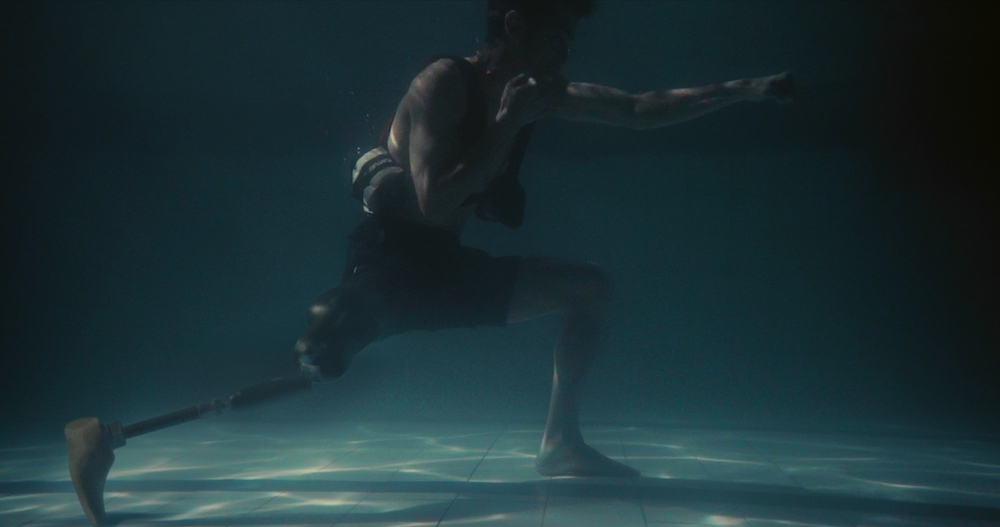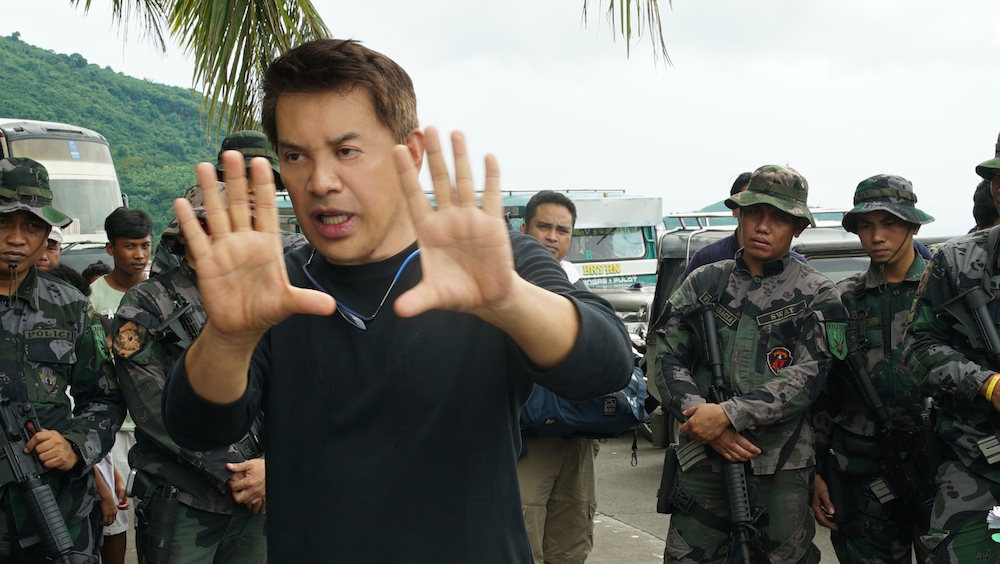Fighting with Your Emotions in HBO’s ’Gensan Punch‘
The first time Japanese boxer Nao Tsuyama (Shogen) meets his Filipino coach Rudy (Ronnie Lazaro), the unkempt and grumpy instructor is brawling at the General Santos City pier. An argument has turned bad and it’s at this curbside altercation, among the tuna and fishing boats, that the tone of this surrogate father-son relationship is established.
Nao and Coach Rudy’s intense and often rough default love among pugilists is just one of the emotive dynamics that makes up the best parts of Gensan Punch, it’s also the narrative ballast that anchors what might easily be just another sloppy sports movie capitalizing on meme-worthy “chase your dreams” palliatives.
To producer and director Brillante Mendoza’s credit, he’s picked a great story in terms of the sports film genre: who’s more of an underdog in combat sports than a disabled one?

You couldn’t wish for a better inspiring narrative baseline than the true story of Japanese amputee Naozumi Tsuchiyama, imbued with a top shelf fighting spirit and work ethic yet denied a professional license by his country’s boxing commission for failing “physical condition regulations.”
After so many appeals to the apathetic officials, Nao takes a chance at getting a license abroad through Gensan Punch in General Santos City, the famed gym where Filipino champions have been trained.
Arriving in Mindanao, Nao is introduced to the boxing family through gym owner Ben (Jun Nayra), his wife Mina (Evangeline Torcino), their daughter Melissa (Beauty Gonzalez), and later on Ronnie Lazaro’s gruff but loving Coach Rudy. It’s here the film finally picks up and finds its emotive, action-filled pace, fulfilling its promise about an embattled boxer whose greatest disability isn’t his leg, rather it’s his losing battle with his own country’s social lens against the handicapped.
An embattled boxer whose greatest disability isn’t his leg, rather it’s his losing battle with his own country’s social lens against the handicapped.
Japanese model turned actor Shogen (Street Fighter: Assassin’s Fist) portraying Nao with his puppy dog eyes and quiet passion, smoldering at the right times, is perfect for this role. He looks the part, too. Shogen trained and worked out for a year prior to shooting and got into that shape where boxers look like they’re carved out of wood. His movements look legit for the most part, even the stiffness in his footwork, due to the hobbling brought on by a prosthetic leg, is spot on.
The action treatment gets plenty of help through real-life boxing siblings, the Laurente brothers—Criz Russu, Criztian Pitt, and Criz Sander. Along with some familiar faces in the local Filipino fight community (points to anyone who can name the prodigal son of Coach Rudy), the brothers lend an authenticity to the in-ring scenes shot according to Mendoza’s now infamous "non-scripted method." Though the shaky camera work can be a headache to follows, the payoff sans choreography is worth the viewing hassle—the fights have a kinetic and accurate feel, like there’s always something at stake.
The movie premiered at the Tokyo and Busan Film Festivals, and in the latter it won the Kim Jiseok Award for films that reflect the contemporary standing of Asian cinema. Honee Alipio’s script hits all the requisite notes of the underdog arc, while also never quite coming to a redemptive denouement. Nao’s portrait as a half-American kid born from an emotionally distant, white military father can be a passive shrug most of the time—we see glimpses of Jeffrey Rowe as the dad in the flashbacks, but neither he nor Nao’s single mother (Kaho Minami) add much to our hero’s depth of character. Neither do we actually see the childhood “accident” that rendered Nao with right leg cut from the knee down. Except for soft focus scenes where a young Nao is holding a medal in a soccer uniform, sometimes Nao just feels like a black mirror: a walking story void of personality that nevertheless reflects a greater social framework.

The killer combos here are the cross cultural frictions. How Nao finally finds a place where he is treated as a fighter of ability rather than as mere person of disability and, later on, a boxer of note. He quickly finds out that the poverty of Gen San City is exactly why it’s a breeding ground for world-class boxers. One lingering shot where someone is writing down the relatively low academy rates on a whiteboard is a dismal reminder of how being an athlete, amateur or pro, in the Philippines (considered a boxing country) is like choosing a life for a small chance at bloody glory, yet at a high risk of utter destitution.
Two plot turns that might make casual boxing fans gasp and clutch their pearls will also come as zero surprise to anyone who’s spent time in any fight business for a year. Hint: they involve envelopes.
I loved the underwater punching drills and other similar visual dramatics at placing location as a character. Pier shots, the tuna festival, and the Visayan speech of the boxers—even Ronnie Lazaro’s awkward Bisaya-glish that mimics Pacquiao feels apt—makes it all feel very Pinoy. As a plus, it comes sans the lens of someone from Manila looking at all the bucolic splendor as a haven for the noble provincial pulling up his bootstraps to make it to the big leagues. Which is why it stands out like a sore thumb when Coach Rudy wraps a bandage over Nao’s prosthetic leg in the middle of the fight, something that won't ever be allowed in a pro match. Also, the insinuation that Nao and Melissa (Gonzalez) slept together is outright strange and even feels filthy, especially since neither mention it again, thereby adding nothing to the story.
As Nao’s relationship with Coach Rudy and his teammates blossoms, he also discovers how his personal codes clash with the realities of Third World pro boxing life. Despite how much he’s come to love his team, he doesn’t fit in with Filipino culture; a place where you get along to go along, where teammates are routinely grinding for their families to escape privation, where passions always run high and the literal volume of your quarrels are proportional to your affection. It’s amazing to finally see Nao harnessing his pent-up frustrations and channeling them into his match, finding that fighting with your emotions is also a tool in the pugilist’s kit.
Our hero is chasing very different demons. Despite his stoicism he dotes on Coach Rudy as surrogate father (even buying the old man a set of trainers early on, when he sees that coach’s shoes are split wide open), setting up an emotionally volatile scene later on, where Japanese bushido honor collides with Filipino “ingenuity” in winning, nudge-wink. As a corollary, two plot turns that might make casual boxing fans gasp and clutch their pearls will also come as zero surprise to anyone who’s spent time in any fight business for a year. Hint: they involve envelopes. An easy example that won’t spoil those twists is how the Games and Amusement Board officials don’t give a fig if Nao is disabled at all—as long as he wins three fights in a row he’s gravy, here’s your license, thank you, come again. How does that compute as filmic opinion on the differences of ableism empowerment between First (Japan) and Third (Philippines) World countries?
Gensan Punch may not be a quintessentially great boxing movie, but it’s a solidly crafted 110 minutes of visual drama and high energy. Watch it for Shogen. Watch it if you’re a boxing aficionado. Watch it for its unique point of view that walks willingly into the championship rounds with the intention of going out swinging against the forces of ableism that plague the hurt business.
“Gensan Punch” screens exclusively on HBO GO starting Dec. 16.


